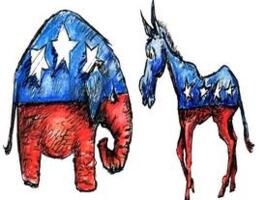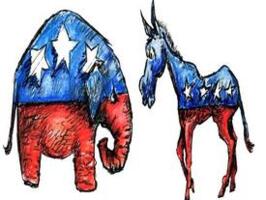Lugar Loss Highlights Sour Relationship Between Voters and Politicians
A Commentary By Scott Rasmussen
When relationships go bad, an early warning sign is that one side doesn't really hear what the other is saying. That's certainly the case today in the relationship between voters and America's Political Class.
Many in Washington, D.C. took comfort over the past year in polling data showing that fewer voters consider themselves part of the Tea Party movement. Only 13% claim such a tie today, roughly half its peak in 2010. This was reassuring to those in power, suggesting voters were willing to let the politicians return to politics as usual.
But the panic returned to Washington this week following the defeat of 36-year incumbent Senator Richard Lugar in a Republican primary election.
The reality that the politicians missed is that declining membership in the Tea Party did not mean a decline in anger at the Political Class. That's because the Tea Party has always been strongest when it tapped into concerns that most Americans shared. In particular, the Tea Party highlighted the twin problems of continuous government spending growth and a self-serving Political Class out of touch with voters.
Today, only 33% are even somewhat confident that their representative in Congress is looking out for the best interests of their constituents. Only eight percent (8%) are very confident.
Sixty-five percent (65%) are angry at the policies of the federal government, but few see anybody in Washington willing to take on the status quo. There is a strong belief that Democrats are the party of big government and the Republicans the party of big business. Seven-out-of-10 believe big government and big business work together against the rest of us.
So it's no surprise that 53% believe that neither Republican nor Democratic leaders have an understanding of what the country needs today.
Confirming the disconnect is the fact that government spending has gone up every single year for 58 years even though voters have elected presidents and members of Congress who promise every election to cut that spending. As I show in my book, The People's Money, voters are ready to make the hard choices needed to cut spending and balance the budget, but the Political Class is more interested in pursuing its own agenda.
As a result, if given a choice to keep or replace the entire Congress, 68% would throw them all out. Only 11% would keep them.
Ultimately, the relationship between voters and politicians has gone sour because they are focused on different goals. Voters are interested in a society that works, while politicians are focused on making government work.
From the perspective of voters, the major political divide in the nation is between mainstream Americans and the Political Class. Politicians would prefer to ignore that divide and focus on whether DC Republicans or DC Democrats should run the club for the next couple of years.
In many troubled relationships, both sides deserve some of the blame. But the United States is a nation founded on the belief that governments gain their legitimacy only from the consent of the governed. In the relationship between the people and the Political Class, that means the voters are right and the politicians need to change.
COPYRIGHT 2012 SCOTT RASMUSSEN
DISTRIBUTED BY CREATORS.COM
See Other Political Commentaries.
See Other Commentaries by Scott Rasmussen.
Rasmussen Reports is a media company specializing in the collection, publication and distribution of public opinion information.
We conduct public opinion polls on a variety of topics to inform our audience on events in the news and other topics of interest. To ensure editorial control and independence, we pay for the polls ourselves and generate revenue through the sale of subscriptions, sponsorships, and advertising. Nightly polling on politics, business and lifestyle topics provides the content to update the Rasmussen Reports web site many times each day. If it's in the news, it's in our polls. Additionally, the data drives a daily update newsletter and various media outlets across the country.
Some information, including the Rasmussen Reports daily Presidential Tracking Poll and commentaries are available for free to the general public. Subscriptions are available for $4.95 a month or 34.95 a year that provide subscribers with exclusive access to more than 20 stories per week on upcoming elections, consumer confidence, and issues that affect us all. For those who are really into the numbers, Platinum Members can review demographic crosstabs and a full history of our data.
To learn more about our methodology, click here.





